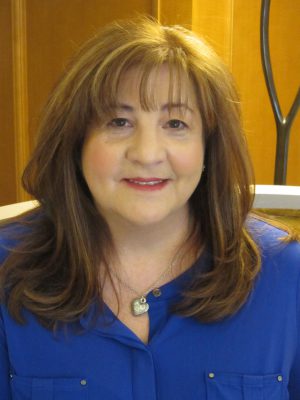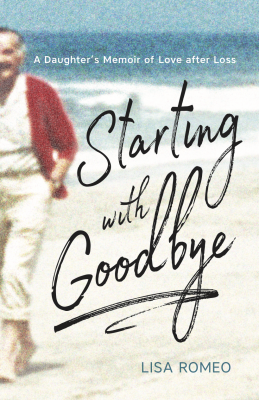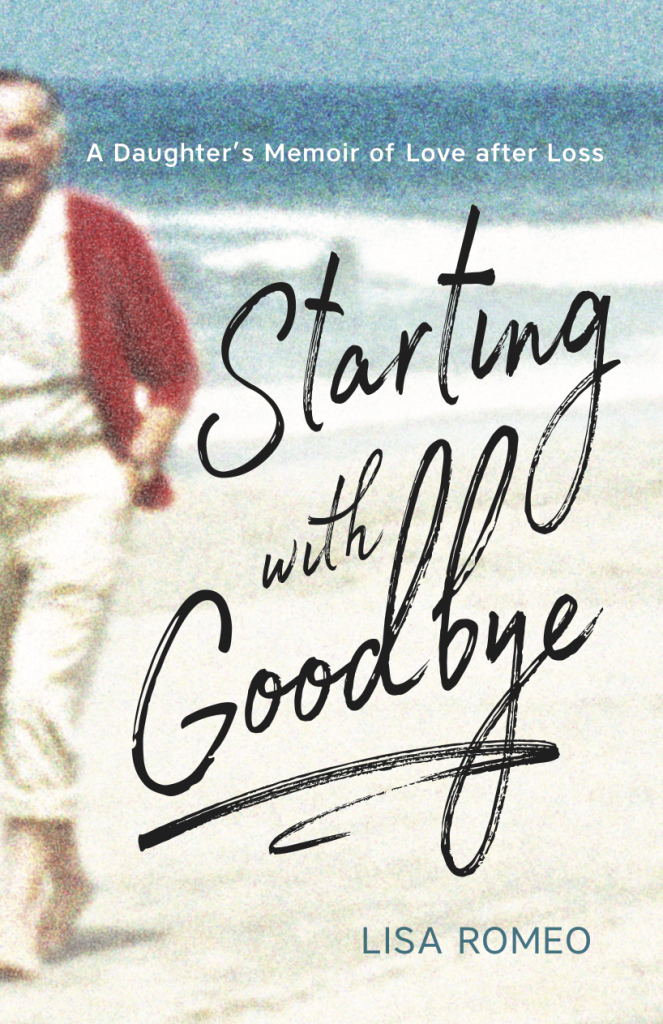
When I first met Lisa Romeo eleven years ago at a memoir-writing conference in Hartford, I knew I’d met a kindred spirit. She is an accomplished essayist, editor, writing teacher, and book reviewer. For more about her numerous accomplishments, you can visit her website. Then in May she became the author of a compelling memoir, Starting with Goodbye: A Daughter’s Memoir of Love after Loss about healing her relationship with her father after his death.
Lisa has been supportive to many authors as they have launched their books. In fact, she was one of the first people to review Why I Left the Amish, which led to the nomination of it for the Foreword Reviews Book of the Year Award. She also came to one of my first book talks in New Jersey. I wish her every success with this memoir, and I hope the support she has shown to other authors is coming back to her many times over.
Today I am sharing an interview with Lisa about Starting with Goodbye.

1. In your career as a writer, you have written and published many essays. How is writing a memoir different? How is it similar?
I’ve written a number of long narrative essays (in the 4,000-word range), and except for length, the same general tenets apply—tell a story; bring the narrator and secondary characters to life; find meaning within memory; make smart use of dialogue, scene building, and metaphor; weave in reflection; pull the reader along with tension or conflict, etc.
Full length memoir though demands that a writer think in a much bigger sweep, an arc that extends over 80,000 words; you need to consider and plan enough places in the text to alternately surprise the reader, to pause, to be insistent, to withhold and then releasing story elements at just the right time. I don’t claim to have a formula or system for all of that. Much I think is instinctive, or rather I should say, for me it evolved organically as new parts of the story revealed themselves. So much of memoir is about echoes and pulling threads through, showing the reader how X on page 15 is connected to Y on page 128 because of Z on page 99, but doing it artfully. Hence, the many drafts!
2. How did you arrive at the format for this book?
There’s an outer frame to the book, a timeline that begins with my father’s stroke three months before his death, and ends about two-and-a-half years later. But within those bookends, there is a good bit of moving around in time, from periods just previous to the stroke, to events from decades before, with stops in between but always returning to the unfolding moment.
This seemed like the best structure because I was writing the memoir after having written many individual linked essays, and I needed to find a way to drastically depart from that and think more broadly. I had to break apart all of those essays, ditch some material, expand other material, write new sections, figure out a way to tell the story as an integrated whole.
When contemplating structures, I knew I needed a chronological starting and ending point, but like many memoir writers, I found that memory doesn’t follow a linear track, but moves around, thematically connecting past events with the “present” taking place in the main story. So, I needed a firm frame, but also needed to know that within it, I could meander. It’s what I call the “dinner-table” storytelling model—you begin telling your friends about what happened yesterday, which reminds you of what happened two years ago, and the only way to understand both events is to then tell what happened 20 years before that…and so on.
3. Did your husband and sons know you were talking to your father after his death? If so, what were their reactions?
I recall mentioning it from time to time, but usually couched in, “I dreamt about my father last night…” I was uneasy discussing it out loud, though I did begin writing about it almost from the start, and when a few of those essays were published, the gig was up. No one thought I was nuts, though my husband Frank was dubious; my sons actually began reporting that they’d “seen” their PopPop a time or two as well. After my father-in-law passed away two years ago, Frank seemed more understanding when he was reading the final manuscript.
4. Did you ever mention your father’s visitations to your siblings or mother? Why or why not?
Not that I recall. I may have mentioned it to my sister, and she and my mother read some of the early essays. It wasn’t as if I was keeping it secret—it’s just my way to keep a lot to myself unless prodded. Distance was a factor too; I’m in New Jersey, my sister lives in Massachusetts, my mother and brother were living in Las Vegas. And, as I mention in the book, my mother did not talk about him after he passed. At first this bothered me—after all, they’d been married for 59 years, together for 64—but eventually I accepted that grief takes many forms, and I suppose hers was a silent, internal experience.
5. I’ve noticed that it often runs in families for someone to be able to “see” a person who has left this world. Did you have this ability before your father’s death? Do you know of anyone else in your family who has had this experience?
I didn’t know that! How interesting. No, it hadn’t happened to me before. When I was living in Southern California in my early 20s, I often stayed overnight at my cousin’s house and heard him talking late into the night. For a while I assumed he was on the phone, but then he told me he’d been talking to his dead mother for years—she’d sit on the couch opposite from him in his living room at night.
6. You allude to your mother’s death in the book a few times. Did her death affect you differently than your father’s? If so, how?
Much differently. She and I talked and talked our whole lives, enjoyed doing things together, fought and disagreed, and we shared many adventures. When she passed, everything between us felt complete, and my grief was not prolonged or complicated as it was for my father. He was someone I had trouble talking to, and did not feel naturally at ease with. A lot was left unsaid.
Part of the reason I find Starting with Goodbye to be so poignant is because of my own struggle to come to terms with my relationship with my mother. “A lot was left unsaid” is a beautiful way of stating the feeling of living with an unresolved relationship with a parent who has left this world.
You can read Starting with Goodbye to find out how Lisa Romeo came to terms with her relationship with her father after his death. On Lisa’s order page you have choices about how to purchase the book.
Lisa can be found on Twitter, Facebook, and LinkedIn. She is happy to respond to your questions and comments.



Because of this interview I plan to read the book.
Thanks, Mary! Hope you enjoy it.